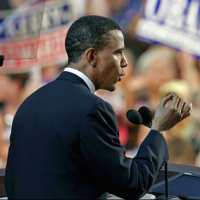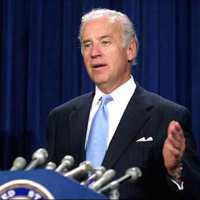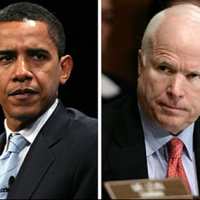- About Us
- Columns
- Letters
- Cartoons
- The Udder Limits
- Archives
- Ezy Reading Archive
- 2024 Cud Archives
- 2023 Cud Archives
- 2022 Cud Archives
- 2021 Cud Archives
- 2020 Cud Archives
- 2015-2019
- 2010-2014
- 2004-2009
 |
Ezy Reading: After The Conventions — Sour Grapes, Venom and Theocracy Play Out in the U.S Presidential Election |
There’s no real quantifiable means by which to assess the last eight years of the Bush administration as having been a success. This isn’t some ‘liberal take’ on things, it’s a statement of fact, as evidenced by the Republican Party’s own attempts to distance  themselves from President Bush during this current election cycle. Though time will offer the final proof — even some historians’ views of Richard Nixon have softened in recent years — it does appear that this will likely be remembered as one of the most inept and failed presidencies of the modern American era. The list of offenses is as long as it is painfully all-too-familiar: the war in Iraq and neglect of priorities in Afghanistan, a record budget deficit, Hurricane Katrina, abuse of civil liberties, seemingly endless Republican scandals from one month to the next, and a bullish disregard — and apparent conceit — for the United Nations and America’s fallen standing in the world. All this and more, yet amid the crises George Walker Bush still managed to find the time to take more vacation days off than any other standing President.
themselves from President Bush during this current election cycle. Though time will offer the final proof — even some historians’ views of Richard Nixon have softened in recent years — it does appear that this will likely be remembered as one of the most inept and failed presidencies of the modern American era. The list of offenses is as long as it is painfully all-too-familiar: the war in Iraq and neglect of priorities in Afghanistan, a record budget deficit, Hurricane Katrina, abuse of civil liberties, seemingly endless Republican scandals from one month to the next, and a bullish disregard — and apparent conceit — for the United Nations and America’s fallen standing in the world. All this and more, yet amid the crises George Walker Bush still managed to find the time to take more vacation days off than any other standing President.
With the respective Democratic and Republican Party Conventions now at an end, we enter the final phase of the federal election season and arguably the most compelling.
Three extended thoughts in the aftermath of the conventions:
First, as the polls currently indicate, this race is still very much alive, and any party could seize victory come November. It is for this reason that the forthcoming Obama-McCain debates will prove particularly critical given the role that mere slip-ups may now play in affecting an outcome. The risks of a radical attack or  shift in tactics backfiring is so great that logic dictates we’ll most likely see a fairly conservative final run toward the ballot box from each candidate. With the stakes so high, however, anything is possible. What is certain is that things are only going to get nastier.
shift in tactics backfiring is so great that logic dictates we’ll most likely see a fairly conservative final run toward the ballot box from each candidate. With the stakes so high, however, anything is possible. What is certain is that things are only going to get nastier.
Second, regarding this aforementioned ‘nastiness to come’, while the Democrats did bare their teeth at least a little during the convention, it isn’t going to be enough. Obama delivered a fine nomination acceptance speech and merits respect for refusing to stoop as low in the level of dialogue as his opponents, but while few could wish for him to abandon his core principles as recklessly as McCain appears to have done since the 2000 version of himself, the Democrats cannot win by playing a soft ball defensive game of ‘polite retorts’ and targeting their appeal within the margins of the left. Obama needn’t go to McCain-lengths of pander, but he has been wise to shift slightly further towards the center in recent months for the sake of broadening his base. Unfortunately this also runs the risk of costing Obama the impression that he is the dynamic agent of ‘change’ and could also lose him some youth votes — votes that are just as important as those rural and older white voters who need to be convinced he isn’t a radical liberal. It’s a tough path to navigate.
At the same time, Obama also needs his own attack dogs — principally Joe Biden — who can afford to be more vocal on message to get aggressive. The Republican convention may have been short on detailed solutions to problems and free of any mention of the American working class, but they took the proverbial gloves off in rhetoric that demands to be countered in kind.
gloves off in rhetoric that demands to be countered in kind.
Perhaps most important of all in rallying the troops is that Hilary and Bill Clinton need to set aside their primary season bitterness and get mobilized for the sake of their own party and personal philosophical beliefs. Both made a strong start on this in their respective convention speeches but Hilary, in particular, must issue an out-and-out directive to those of her supporters still upset over the Obama nomination that by abstaining from voting in this election — or, even worse, by voting for John McCain — they will be displaying about as pathetic and potentially destructive a case of sour grapes as is possible. That to do so would effectively insult and betray Clinton’s political soul. Furthermore she must clarify that Governor Sarah Palin is by no means Hilary Clinton — not by a stretch. Palin may have proven herself at least for now — while still protected from the direct fire of questions from the national press corps — to be an aggressive speechmaker, but it surely had to anger many Hilary supporters that the Republican Party thought of them as to be little more than feckless robots who would simply ‘vote for a woman, any woman’ if presented with an alternative candidate. It is in Hilary’s own interest to visibly help rescue the party that she still one day may want to lead from the White House, and her husband could do well to try and repair some of the legacy of his own that he so tainted over the last twelve months by inviting Clinton voters back into the Democratic fold.
The third observation to come out of the conventions was of just how little distance the Republicans seemed to practically evidence between themselves and a Bush administration they so clearly want the public to believe never even existed. Mitt Romney looked the fool — admittedly this wasn’t a first for him- — by  asserting that his party would, under McCain, squash the liberal elite who had ‘dominated Washington for so long’, apparently forgetting in the process that it has been his own party at the helm in the capital for the previous eight years. But this, of course, is pure politicking, as is the fact that every major speech at the Republican convention — particularly John McCain’s — adopted the Obama campaign catchphrase of ‘change’ for their own. Nowhere, however, in any of these speeches was there evidence of any fundamental, dramatic shifts in policy from the current Bush administration. Instead, as discussed earlier, the bulk of the Republican convention either seemed focused on selling the character of John McCain as war-hero, or was disappointingly dominated by mean-spirited personality-based attacks that had little to do with substantive politics. This aggressive bluster may have served well in uniting a Republican Party that never cared much for McCain to begin with, but how sniping and contemptuous talk will play out among a nation of individuals struggling under the weight of war and economic recession and looking for concrete answers to their plight remains to be seen. Consider in this respect Giuliani’s cackling and wholly offensive dismissal of ‘community service’ in his speech as laughable.
asserting that his party would, under McCain, squash the liberal elite who had ‘dominated Washington for so long’, apparently forgetting in the process that it has been his own party at the helm in the capital for the previous eight years. But this, of course, is pure politicking, as is the fact that every major speech at the Republican convention — particularly John McCain’s — adopted the Obama campaign catchphrase of ‘change’ for their own. Nowhere, however, in any of these speeches was there evidence of any fundamental, dramatic shifts in policy from the current Bush administration. Instead, as discussed earlier, the bulk of the Republican convention either seemed focused on selling the character of John McCain as war-hero, or was disappointingly dominated by mean-spirited personality-based attacks that had little to do with substantive politics. This aggressive bluster may have served well in uniting a Republican Party that never cared much for McCain to begin with, but how sniping and contemptuous talk will play out among a nation of individuals struggling under the weight of war and economic recession and looking for concrete answers to their plight remains to be seen. Consider in this respect Giuliani’s cackling and wholly offensive dismissal of ‘community service’ in his speech as laughable.
The fact remains that beyond some throwaway tokenism, there wasn’t even acknowledgment in the Republican convention’s speeches that each party, regardless of their policy differences, does at least have the interests of the United States at heart. This notion was not only absent, it was beaten to a bloody pulp amid the bullish words of Giuliani, Romney and Palin, all loaded as they were with the George Bush-style talk of ‘you’re either with us or against us’/‘it’s us versus them’. Sure, McCain spoke of partisan co-operation in his acceptance speech, but by then the seeds of negativity had already been planted by his peers. This kind of discourse doesn’t just poison chances for bipartisanship in the aftermath of an election, it divides a nation.
What may play out well for Republicans in the aftermath of their convention, irrespective of the fact it is completely unrelated to any notion of change, is the reaffirmation of the role of God in politics thanks, especially, to Sarah Palin. At times if you listen to Republicans — and, granted, there are also many Democrats who plainly vie for the Evangelical vote as well — it sounds like some of them would just as soon convert their country wholesale into a Christian theocracy that would rival the Muslim-faith governed nations of the Middle East. Known well in her home state of Alaska as a staunch conservative whose politics are fused with faith, Palin will attract many of the conservative voters who had been alienated away from McCain’s tenuous (in their eyes) past positions on abortion.
to Sarah Palin. At times if you listen to Republicans — and, granted, there are also many Democrats who plainly vie for the Evangelical vote as well — it sounds like some of them would just as soon convert their country wholesale into a Christian theocracy that would rival the Muslim-faith governed nations of the Middle East. Known well in her home state of Alaska as a staunch conservative whose politics are fused with faith, Palin will attract many of the conservative voters who had been alienated away from McCain’s tenuous (in their eyes) past positions on abortion.
In this sense Palin was a shrewd choice given the significant role that the abortion issue plays in making up many Americans’ minds during an election year. Republicans felt it was inappropriate for those in the media to discuss the out-of-wedlock teen pregnancy of Palin’s eldest daughter and perhaps it was. At the same time, others also argued that if anything the situation reinforced the statistically proven failure of abstinence programs and cut directly into the questioning the credibility of Palin’s own tough talk on morality and her ability to competently ‘govern’ outside of her own home.
Either way, in drawing heavily from another page in the book of George Walker Bush, the Republicans have chosen themselves a formidable ally in Palin, and someone who, at least at this stage, isn’t afraid to ply voters into supporting her with the implied, guilt-ridden message of ‘If you vote for me, you’re voting for Christian values, heck, you’re essentially voting for God. Don’t vote for me and, well … You know the consequences … ’
 In the final analysis, what emerged from the Democratic and Republican conventions is that McCain and his party are pushing to make the focus of their campaign about character over policy, buttressed by aggressive, low-blow attacks that appeal to the Republican base. Between now and November 4th we’ll continue to hear at length about McCain’s war record, his honesty and integrity, and his experience. Barack Obama’s greatest weakness is his lack of experience, and as a result the Democratic convention tried to put more focus upon conveying the message that he not only represents change, but that McCain is merely an extension of the last eight years of the Bush administration, during which he famously sided on votes with Bush 90% of the time. The Democrats need to get more aggressive on attacking — and repelling — the Republicans if they are to stand a chance to win this election, and yet so far it seems that if anything they have been held back by a restraint and civility that is part of what made Obama so popular with many in the first place. Sadly, in the face of morality and — let’s be honest about it — race being used as just some of the many aggressive campaign batons in a bag of countless dirty, off-policy Republican tricks, restraint and civility may prove to be the ultimate undoing of the Obama campaign.
In the final analysis, what emerged from the Democratic and Republican conventions is that McCain and his party are pushing to make the focus of their campaign about character over policy, buttressed by aggressive, low-blow attacks that appeal to the Republican base. Between now and November 4th we’ll continue to hear at length about McCain’s war record, his honesty and integrity, and his experience. Barack Obama’s greatest weakness is his lack of experience, and as a result the Democratic convention tried to put more focus upon conveying the message that he not only represents change, but that McCain is merely an extension of the last eight years of the Bush administration, during which he famously sided on votes with Bush 90% of the time. The Democrats need to get more aggressive on attacking — and repelling — the Republicans if they are to stand a chance to win this election, and yet so far it seems that if anything they have been held back by a restraint and civility that is part of what made Obama so popular with many in the first place. Sadly, in the face of morality and — let’s be honest about it — race being used as just some of the many aggressive campaign batons in a bag of countless dirty, off-policy Republican tricks, restraint and civility may prove to be the ultimate undoing of the Obama campaign.
Send your comments to feedback@thecud.com.au
